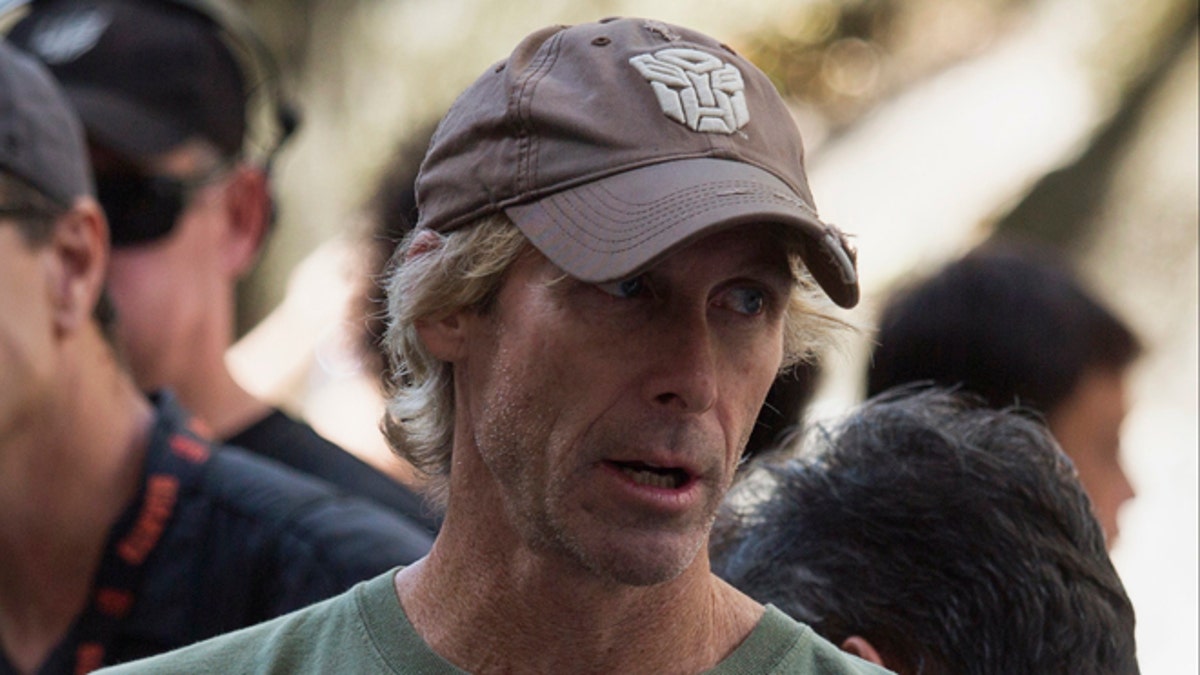
Oct. 18, 2013: U.S director and producer Michael Bay speaks during the filming of a scene for the movie "Transformers: Age of Extinction" in Hong Kong. (Reuters)
Growing hostilities and security problems abroad have prompted industry and intelligence experts to caution Hollywood studios and filmmakers to take extra security initiatives when filming in remote or hostile regions.
The Producers Guild of America issued a warning with guidelines in "Staying Safe When Shooting Abroad" on its website. Director of Communications Chris Green said the Guild was disturbed to learn of a recent violent attack on its members filming overseas. He said foreign budget incentives have made international productions attractive, but they have also paved the way for more serious risks.
“Producing can be a dangerous business, particularly on less friendly turf. We felt it was important to get this information out,” Green told FOX411, adding that there are numerous factors producers must consider in today’s global production industry.
“Be sure to check State Department alerts, research local customs and cultural expectations, hire a reputable company to provide security and, once on location, register with the U.S. embassy.”
Tony Schiena, CEO at MOSAIC – Multi Operational Security Agency Intelligence Company – agreed that security measures are too often a second thought for Hollywood honchos. He said a major studio recently called him at the 11th hour after hearing warnings directed at talent starring in a film they were preparing to shoot abroad. Just this week, he said he had to advise a studio executive shooting a big-budget movie in an extremely anti-American environment not to jump between regional borders without operational security steps in place.
The State Department remains concerned about the continued threat of terrorist attacks, demonstrations and other violent actions against U.S. citizens and interests overseas; earlier this year it issued a "Worldwide Travel Alert" for Americans doing business abroad.
Immediately after 9/11, the FBI issued warnings to Hollywood studios that they could be targeted, but industry and intelligence experts say the reins have been relaxed.
"More so than ever, celebrities or other high-profile public figures are an attractive target to extremists and terrorists," said Del Wilber, a former government intelligence and counterterrorism operative. "They will generate a large amount of news media attention and publicity if they are attacked or taken hostage, which is one of the things terrorists covet."
Last year, director Michael Bay suffered minor injuries in one of two extortion attempts on the set of "Transformers 4" in Hong Kong. Filming was interrupted when two men demanded $12,900 from the filmmakers and one of the men attacked Bay after police arrived to control the situation. A second incident occurred when four men approached a female crew member and demanded money.
But a greater concern is that prominent individuals are attractive targets for abduction and attack, experts say.
"Just imagine the media storm if a big star was kidnapped. If 19 Middle Easterners can come into our country and hijack our planes, they can easily take a famous person's car," said Tim Clemente, founder of the film consulting firm X-G Productions and a former terrorism/tactical operations special agent for the FBI.
Experts warn that it’s only a matter of time before something sinister happens to celebrities. Dom Raso, a former Navy SEAL and founder of the tactical training/defense firm Dynamis Alliance, said that when it comes to foreign on-location security, very few plans are put in place and production companies rely on local law enforcement to keep them informed.
“Hollywood takes the path of least resistance,” Raso said, adding that there have been recent concerns about foreign hotels being cased and information being obtained regarding high-value targets. “One of the biggest threats is technology – emails and geographic locations being traced.”
But Bertram van Munster, co-creator and executive producer of the globetrotting reality series “The Amazing Race," said the best security tactic Hollywood can take is to avoid a hot zone in the first place.
“There’s no reason to go to a war-torn zone while we are doing entertainment,” he said. “The world is still a very safe place to travel, contrary to what you might see on television. Of course there are certain hotspots you shouldn’t go to, places with war or certain diseases or what have you.”
But Wilber says studios are having problems determining which locations are “hot spots” these days.
“Unless filming at the South Pole, production companies must assume they are under threat wherever they film,” he said. “Even tourism travel by well-known, well-recognized celebrities is presenting serious concerns behind the scenes.”
Follow @holliesmckay on Twitter.






